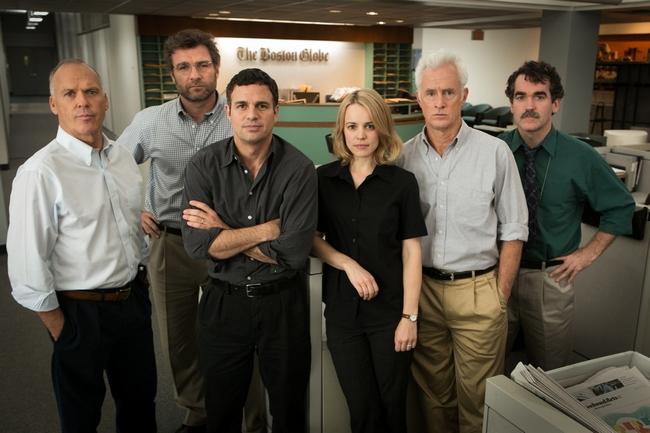"Spotlight" Is Riveting, Realistic
By Marc J. Wortman
I was a bit reluctant to see "Spotlight," the true story of the Catholic Church’s priest child-sexual-abuse scandal and cover-up, even though this film is quickly gathering the momentum to be an Oscar front-runner, (recently nominated by the Golden Globes and the SAG Awards, which are reliable predictors for the Academy Awards). Sometimes it’s a tough choice on a Saturday night whether to see an action-packed “popcorn” movie and escape into the fun and fantasy or actually choose to see a serious movie about child abuse. "Spotlight," delivers a truthful and non-sensationalized portrayal of one of the biggest scandals in modern history, told from the vantage point of a handful of Boston Globe investigative reporters in 2001. The movie is based on the reporting done by the Spotlight section of the Globe, known for its independent, hard-hitting and in-depth stories. From a pure moviemaking point of view, "Spotlight" is very close to a perfect film, and reminds me of how I felt after watching 2013’s Best Picture Winner, "Argo" – silent and breathless. The veteran actor and writer Tom McCarthy (who wrote the screenplays for "Up" and "Million Dollar Arm") is the director of "Spotlight." He is also the co-writer, along with Josh Singer, of this daring and disturbing script. I predict an Oscar nomination for McCarthy not only for directing but also for Best Screenplay. "Spotlight" is reminiscent of the iconic newspaper movie, 1976’s "All The President’s Men," which told the story of Nixon and Watergate from the perspective of the two newspaper reporters that untangled the web of lies that ultimately led all the way up to the presidency. In an NPR interview, Tom McCarthy actually referenced several films as direct influences on "Spotlight," including "All the President’s Men," as well as Sydney Lumet’s 1982 Oscar-nominated film, "The Verdict." The movie opens, not at the Boston Globe, but at a Boston police station in 1985. It is rare that one setting and one scene can set up and encapsulate an entire movie. We first see, through the dingy glass, a mother and her children whispering to men in robes. The rookie cop at the desk asks what’s going on and we learn that the children were abused by a local priest named Father John Geoghan, the “ground zero” molester and monster that started the original investigation. We also learn that no one is going to do anything about it. As the movie progresses, the director seamlessly juxtaposes these almost matter-of-fact, and often gut wrenching stories of victims alongside the myriad of people connected to the Boston Archdiocese who continuously turn a blind eye. This sweep-it-under-the-rug prevailing attitude, emanating not only from the clergy, but from many other Boston “institutions,” including lawyers and the court system, is one of the main themes of "Spotlight." This sobering fact is strewn about the film, not out in the open like a rabid dog, but rather like an evil virus that spreads undetected in and out of the soul of the city. We are then thrust into the inner workings of the Boston Globe in 2001, soon after its purchase by the New York Times. Here we quickly meet the protagonists and cast of characters that push this film along and work as a true ensemble. The performances are nuanced and almost all are spot-on with a sense of realism and sharing of screen-time not often seen with such a star-studded group of A-listers. The standout performances are the truly versatile Mark Ruffalo as the real-life Spotlight reporter, Mike Rezendes, and the newly ordained Oscar-nominated Michael Keaton who plays the Spotlight’s tenacious editor, Walter ‘Robby’ Robinson, as well as Stanley Tucci, playing the ragged yet heroic attorney Mitch Garabedian, and last but not least, Liev Schreiber as Marty Baron, the quintessential outsider, brought in from the New York Times, who slips into this provincial town not only as a trespasser to Boston, but also an interloper to the Church. Throughout the film I was amazed by the small intricacies that the director brought to the big screen and how the detailed script and the sublime musical score never strayed into the cliche. One of the more memorable and summarizing lines in "Spotlight" is uttered like a confessional by Garabedian in an exchange with Rezendes: “If it takes a village to raise a child, it takes a village to abuse one.” How do you tell such a scandalous story without overdramatizing or over-sanitizing the reality? The brilliance of this film is its surprisingly even tone and structure that meticulously manages to take a very complex narrative and distill it down into a riveting and always realistic investigative step-by-step newspaper drama. It is clear that the director is paying homage to the victims. The interlocking themes of faith, betrayal, and spiritual abuse are uncovered one stone at a time by the Spotlight team. As each new clue brings a revelation as to the sheer scope of the abuse and the size of the cover up, we become more and more invested in the tragedy without the usual cinematic melodrama. "Spotlight" the movie - just like the Pulitzer Prize-winning Spotlight article - achieves its goal of shining a seething light on this chapter in the Church. In the end, the city of Boston became its own character, taking on a collective guilt where no individual was totally absolved of their sins.
|
.
Any original material on these pages is copyright © BishopAccountability.org 2004. Reproduce freely with attribution.
